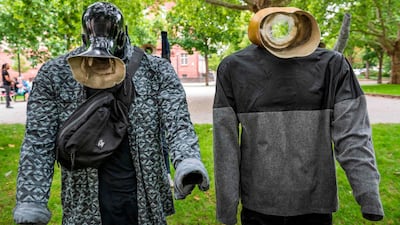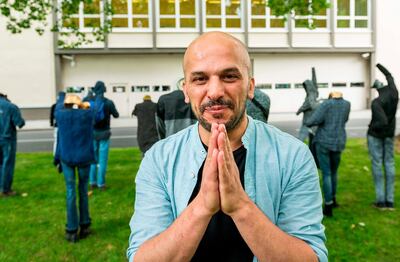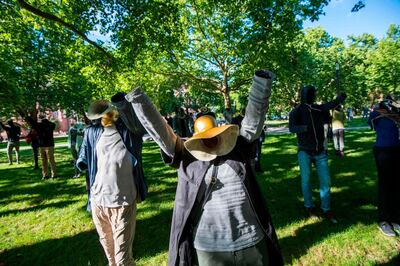An artist from Syria has unveiled an installation, inspired by the victims and survivors of the regime of Bashar Al Assad, outside a German courtroom where a former senior Syrian intelligence official is on trial for crimes against humanity.
Khaled Barakeh's Mute depicts 49 figures dressed in clothes that belong to Syrian activists and tells the story of "an abandoned people" left to fight for freedom and seek justice. It is meant to symbolise the loss and pain cause by crimes committed in Syria, and to pay tribute to those who have stood up for human rights.
“The power of art lies in its ability to allow personal stories and experiences to be told,” Mr Barakeh said on Wednesday.
“I am here today to be a part of a movement towards justice that started with peaceful Syrian activists in Syria and continues across the diaspora. Today, in my mother’s home town Suweida, demonstrations against the Assad regime are taking place, which gives me hope that a revolution is an idea, and ideas never die.
“This artwork intends to bring our voices to the perpetrators who once tried to mute our voices that called for freedom, dignity and justice – however today we take to the streets freely,” he said.
The art is installed in Koblenz, in western Germany, where Anwar Raslan, 57, a former colonel in the Syrian Army, is on trial over involvement in the murders of 58 demonstrators in 2011 and the torture of 4,000 others in the Al Khatib detention centre in Damascus.
Mr Raslan and his fellow accused, Eyad Al Gharib, 43, are being tried on the principle of universal jurisdiction, which allows a foreign country to prosecute crimes against humanity, in a landmark case seeking justice for the abuses committed by the Assad regime before and after protests broke out across Syria in 2011. They deny the charges.
Mr Barakeh is a conceptual artist and activist from Damascus currently living in Berlin.
“At a time when thousands are still protesting in different areas of Syria, after 10 years of a revolution and the continuous brutality of a dictatorial regime, the absence of human beings in my work in front of the court is stark,” he said last week.

“This protest in Koblenz is muted to stress the grieving and sense of unbearable loss that so many Syrians are suffering.
“I wanted Syria’s war criminals to know that survivors of detention and human rights activists are watching. And while they watch in hope that justice will be done, the horror of their experience haunts them to the core.”
Activists will also use the chance to renew their appeal for the release of prisoners from Syria’s notorious detention system. Among them will be Fadwa Mahmoud, a co-founder of the Families for Freedom group, whose husband and son disappeared in Syria in 2012, the latter of whom was killed in prison that year.

“The Koblenz trial is a historic moment for us all and a step towards justice for families searching for their detained loved ones. The families of the detainees and disappeared are striving to secure justice. Khaled Barakeh’s piece speaks to our devastating loss and to the power of people when they come together to hold power to account,” Ms Mahmoud said.
Another member of the group, Lamid Al Khateeb, a dentist from Yarmouk Camp in Damascus whose husband, Niraz Saied, was detained and killed by the Syrian government, said she wished the trials were taking place in Syria.
“I wish the trials would mean freedom for all of our missing loved ones. Accountability is essential but justice will only be done once all detainees are back with their families and able to start the long journey of healing after so many years of torture and injustice," Ms Al Khateeb said.
Wednesday will be day 15 of the Al Khatib trial, at which a torture survivor is expected to give evidence to the court.
Mr Raslan escaped from Syria at the end of 2012 but was recognised by refugees in Germany.




